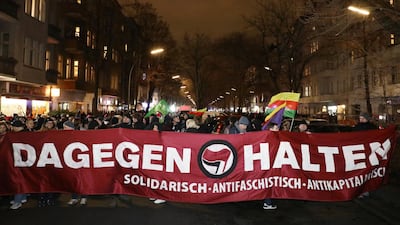Music festivals and merchandise are generating millions in revenue for right-wing extremists across Europe, a report into their funding revealed.
A study commissioned by the German government is urging nations to scrutinise the finances of the far-right. It warns the funding of the movement has been “under-researched” and the resources of extremist groups underestimated.
Based on Counter Extremism Project research, the report reveals how music concerts and festivals generate up to £1.8 million ($2.4m) a year across the countries examined – Finland, France, Germany, Sweden, the UK and US.
“Almost all major extreme right-wing actors are involved in the preparation of concerts or festivals, which offer their members a chance to disseminate propaganda, fundraise, network, and recruit, often in a transnational manner,” it says.
“The transnational violent extreme right-wing movement, despite bans and fines regularly imposed on organisers of some of music or sporting events, is not sufficiently interrupted by authorities and in particular online platform providers through which the merchandise is sold.
“This situation is very different compared to the extremist Islamist milieu, whose financial activities have been far more scrutinised, as well as exposed and therefore are better understood.
“The financial operations of movement remains under-researched, and too often the movement continues to be erroneously viewed as a self-financing entity in poor financial shape.”
Profits have been used to buy or rent properties, around 140 across Germany, it says, which are then used as venues for right-wing activities.
The report says festivals in Germany have registered as political meetings instead of concerts to hinder local administrators in banning the events.
Around 150 right-wing extremist music groups and about 60 songwriters and solo performers are involved in the violent right-wing music scene, it reveals.
“Concerts and festivals are organised in a way that minimises operational costs and maximises hurdles against legal or administrative intervention,” it says.
“They often take place on private property belonging to right-wing extremists or supporters, are registered as political events, and entrance fees are declared as donations.
“More research is needed to further analyse the various online and offline financial activities of the transnational violent extreme right-wing movement and to adequately account for the sums circulating in the milieu, including potential financial irregularities, such as potential tax evasion.
“This lack of analysis can be attributed to the erroneous impression that violent extreme right-wing groups are mainly fuelled by contributions or donations from their members and therefore do not necessitate further financial scrutiny.
“This assumption is only correct as far as individual perpetrators of attacks are concerned. These regularly self-finance their preparations and attacks.”
The report warns of a sharp rise in right-wing extremism in the last five years, with more terror attacks and the Covid pandemic posing a rising threat of online radicalisation.
“The six countries at the centre of this study experienced an overall rise in the violent activities of different extreme right-wing actors,” it said.
“The movement largely sees the Covid-19 pandemic as a chance to spread its ideology more widely and recruit more individuals, especially online.
“However, the pandemic also constrains its offline activities and as a result, it is still too early to judge its medium to long-term impact on the violent extreme right wing movement with a degree of certainty.”
In Germany, right-wing extremists have joined demonstrations organised by various groups protesting against Covid-19 related restrictions and regulations.


